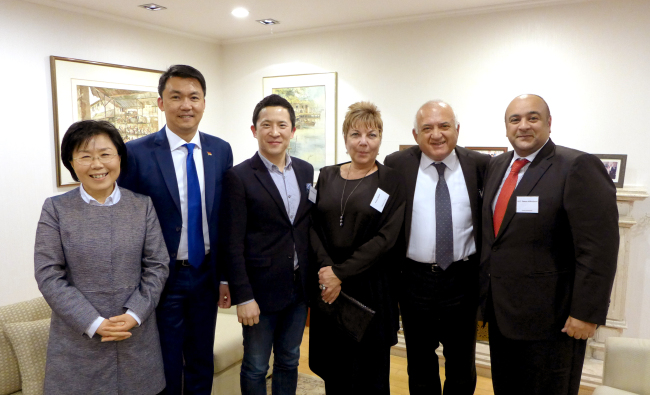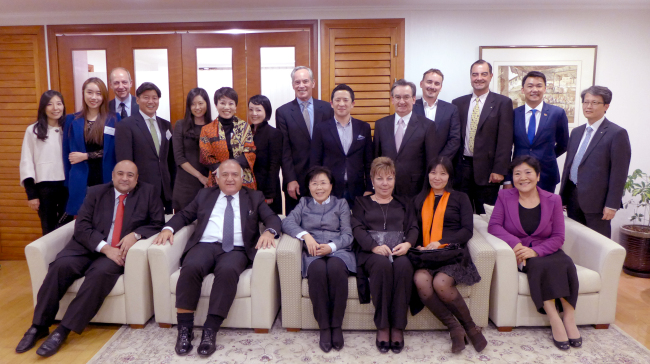Silicon Valley, Singapore offer innovation for Korean firms
By Korea HeraldPublished : Nov. 29, 2015 - 21:57
Working in a place like the U.S.’ Silicon Valley, a place synonymous with high-tech entrepreneurship and innovation, is a dream for many Korean workers, who say they feel like slaves in Korean offices.
This workplace drudgery has become fodder for popular dramas such as “Misaeng,” which last year on tvN satirized the “incomplete lives” of the country’s salaried men and women.
According to a November report by the Bank of Korea, the employment quality of a Korean worker -- measuring stability, salary, work hours, personal development and industrial safety -- was below the average of the 27-member OECD, dragging down the country’s productivity and growth.
Korean employees were also among the least motivated in the world, and the country suffered seriously from emigration, according to the World Talent Report 2015. With soaring household debt, downward investment, weak employment figures and a low birthrate, pundits have urged overhauling the nation’s entire framework.
This workplace drudgery has become fodder for popular dramas such as “Misaeng,” which last year on tvN satirized the “incomplete lives” of the country’s salaried men and women.
According to a November report by the Bank of Korea, the employment quality of a Korean worker -- measuring stability, salary, work hours, personal development and industrial safety -- was below the average of the 27-member OECD, dragging down the country’s productivity and growth.
Korean employees were also among the least motivated in the world, and the country suffered seriously from emigration, according to the World Talent Report 2015. With soaring household debt, downward investment, weak employment figures and a low birthrate, pundits have urged overhauling the nation’s entire framework.

At the Corea Image Communications Institute’s “Korea CQ Forum” on Tuesday, Google executive Mickey Kim talked about his experience in Silicon Valley from 2007-13, illuminating a path for Korean companies.
“An immeasurable gap exists between the company cultures of Korea and America,” Kim said at the Singaporean ambassador’s residence. “Silicon Valley being home to Google, Apple, Facebook, Twitter, HP, Intel, Oracle and Yahoo, there is something special about this place.”
The southern San Francisco Bay Area is a mecca of high-tech research and development, accounting for one-third of all venture capital investments in the U.S. The cluster earned its name in the 1960s and ’70s from the silicon chip manufacturers located in the Santa Clara Valley.
Kim argued that the Silicon Valley enterprises gave workers autonomy over their initiatives, unlike in Korea, where the companies define and drive their projects.
“Whereas Korean workers are bound by their ‘face time,’” Kim noted, referring to the time expected in office, “nobody cared what time colleagues arrived and went home in Silicon Valley.”
Employees managed their schedules and meetings flexibly using software, and freed themselves from “face time,” he said. “The idea was to give workers maximum freedom, but with complete responsibility.”
Kim quipped: “Whereas Korean executives would stress, ‘A crisis is coming! We’re on the brink of a precipice! Let’s tighten our belts and work harder!’ Silicon Valley executives would say, ‘We’ve come this far and are moving toward this goal. Let’s seize these specific opportunities.’”
Silicon Valley workers evaluated their performances quarterly, identifying their objectives and results, which were assessed by peers and managers.
The evaluation classified workers as “meeting,” “exceeding” or “failing” expectations, weighing heavily on their salaries, bonuses and promotion prospects, Kim revealed.
By “meeting” the goals, he or she could continue in their current position, but not be promoted. Those consistently “exceeding” them were fast-tracked up the hierarchy, contrary to Korea, where it has largely been based on seniority. The managers also exercised great authority over their associates and projects, and executives assisted them as “mentors.”
“When visitors come to Silicon Valley they are most surprised by workers playing beach volleyball, swimming and lying on the grass during work hours,” Kim said. “But what they do not see is the coldhearted evaluation underneath.”
California having large populations of lesbian, gay, bisexual and transgender people, workers were “sensitive” about the diversities of religion, gender, race, age and marital status, Kim asserted.
Furthermore, networking occurred year-round, creating new partnerships and friendships; firms encouraged different ways of reaching objectives through slow and strenuous consultation.

Singaporean Ambassador Yip Wei Kiat said that Singapore’s corporate culture was a mix of international best practices and traditional local operations, particularly among start-ups and small and medium-sized enterprises.
Many of the SMEs in logistics, transport, construction consulting, retail, food and beverages were homegrown, he explained, noting that Singapore had always relied on foreign talent and capital to compensate for its lack of natural resources.
“Singaporean companies may not be as liberal as the Silicon Valley firms, but they are definitely one of the most open in Asia,” Yip said, adding that family-owned businesses still followed the “Asian” or “Confucian” ways of business.
“Our philosophy has been to bring in the best from abroad and adapt it locally,” he highlighted. “Promotion based on meritocracy and strict performance evaluation are very much how Singapore works now, both in the private and public sectors.”
Touching on the launch of the Association of Southeast Asian Nations Community, which was inked during the 27th ASEAN Summit in Kuala Lumpur on Nov. 22, Yip said Korean companies could penetrate the Southeast Asian market from Singapore.
As opposed to having separate bilateral arrangements, the envoy said, Korean enterprises could set up operations in different countries covering product development, resource extraction, production and distribution, in an integrated market of 600 million consumers.
“Those companies that are unfamiliar with business practices in ASEAN can undertake experiments in Singapore,” Yip pointed out. “For example, a Korean cosmetics firm can tweak and localize its product to the region’s humid climate and unique customs.”
The ambassador underscored that the embassy supported collaborations between the SMEs on both sides, helping identify partners and establish incubators before commercialization.
Joel Lee (joel@heraldcorp.com)
-
Articles by Korea Herald







![[Graphic News] More Koreans say they plan long-distance trips this year](http://res.heraldm.com/phpwas/restmb_idxmake.php?idx=644&simg=/content/image/2024/04/17/20240417050828_0.gif&u=)
![[KH Explains] Hyundai's full hybrid edge to pay off amid slow transition to pure EVs](http://res.heraldm.com/phpwas/restmb_idxmake.php?idx=644&simg=/content/image/2024/04/18/20240418050645_0.jpg&u=20240419100350)






![[From the Scene] Monks, Buddhists hail return of remains of Buddhas](http://res.heraldm.com/phpwas/restmb_idxmake.php?idx=652&simg=/content/image/2024/04/19/20240419050617_0.jpg&u=20240419175937)

![[KH Explains] Hyundai's full hybrid edge to pay off amid slow transition to pure EVs](http://res.heraldm.com/phpwas/restmb_idxmake.php?idx=652&simg=/content/image/2024/04/18/20240418050645_0.jpg&u=20240419100350)

![[Today’s K-pop] Illit drops debut single remix](http://res.heraldm.com/phpwas/restmb_idxmake.php?idx=642&simg=/content/image/2024/04/19/20240419050612_0.jpg&u=)